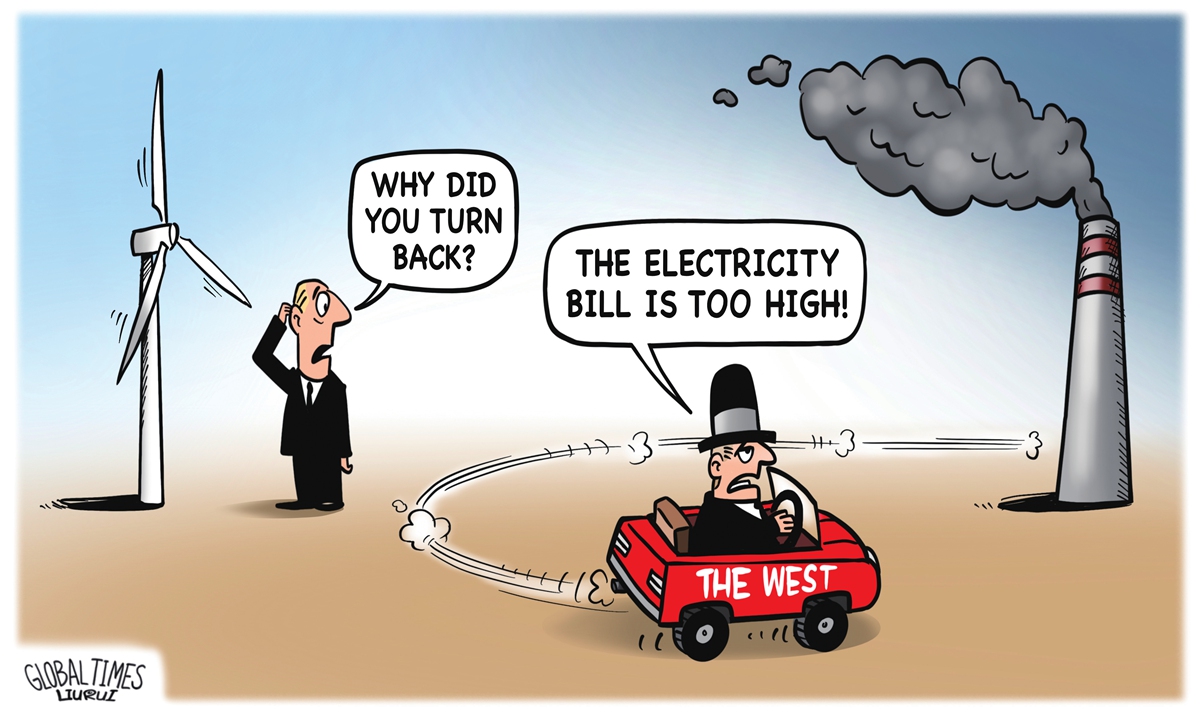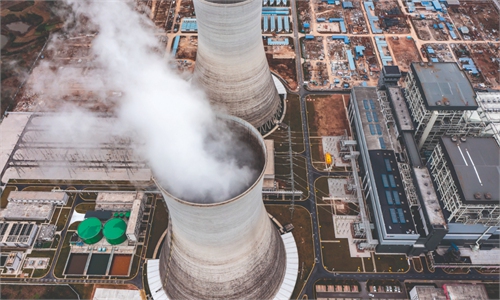It is hoped US has purer motives in dealing with climate change: Global Times editorial

Illustration:Liu Rui/GT
Severe heat and drought have continued to sweep across most parts of the northern hemisphere. The latest research by the World Weather Attribution demonstrates that "human-caused climate change made the event at least 10 times more likely." This drought, which is further disrupting supply chains and pushing up food and energy prices, once again reminds us of the urgency in working together to tackle climate change.Meanwhile, many European countries, including Germany, France, the Netherlands and Denmark have been quietly restarting coal-fired power. They seem to be embarking on a "shift back" to ramp up carbon emissions. It is undoubtedly a setback in terms of joint efforts in reducing emissions on a global scale. It should be said it's a helpless choice for Europe to a large extent. The US pulled together its allies to launch "extreme sanctions" against Russia, and almost wanted to cut off all Russian energy pipelines. The resulting oil and gas shortage has seriously affected the basic life of ordinary people in Europe and "everyone wants to buy coal to hoard."
It is understandable that the goal of reducing emissions has to give way to basic livelihood. But on the other hand, such a situation could have been completely avoided. If a peaceful and stable development environment could have been maintained, would they have arrived at such a plight? If the Cold War mentality and bloc confrontation could have been resisted, would they have arrived at such a plight?
As the initiator of the Russia-Ukraine conflict, Washington seems to be indifferent on this, and has not provided any substantial help. Instead, it has actively blamed China. On the one hand, it is deaf and mute about the European energy crisis and trying to make a fortune out of it. On the other hand, it has resorted to megaphone diplomacy to distort and smear China's countermeasures against US House Speaker Nancy Pelosi's provocative visit to Taiwan, and even slandered that China is "punishing the world" by suspending climate change talks with the US. This contrast itself shows that, in Washington's eyes, tackling climate change is nothing but a stick in its hands.
Washington's motives have never been pure when it comes to tackling climate change. According to the Financial Times, new emission disclosure rules proposed by the US Securities and Exchange Commission will effectively bring a large part of the global business community under US oversight, taking extraterritoriality to the "next level." On the surface, Washington wears a noble moral guise, but what it's calculating is to use the global crisis to control the right to formulate global rules and standards, and to form a global carbon emission pattern that is beneficial to itself. At the same time, it tries to contain, suppress or even interrupt the industrialization process of large and medium-sized developing countries such as China and India.
Also because of the unjust intentions, people have seen that Washington's standard line in addressing climate change is incomparably flexible: When it needs other developing countries to "bleed," it holds high the moral banner, claiming that this is "the world's most important thing," using various negotiating means in order to pressure other countries to set unreasonable goals; when it needs to safeguard its own interests, the climate issue is no longer "the most important thing." For example, due to trade protectionism, the US uses the "Xinjiang-related issues" as an excuse to sanction and suppress Chinese photovoltaic companies and hinder the development of global new energy.
"Behaving in a high profile" on the one hand and "dragging down the whole process" on the other is the true face of Washington's response to climate change. The reason why the US goes back and forth on the Kyoto Protocol and the Paris Agreement is that it regards emission reduction as a tool rather than an end. The US state of Texas recently announced that it will bar 10 companies that resisted fossil fuels. The US Supreme Court not long ago passed a ruling to limit the power of the US Environmental Protection Agency to regulate greenhouse gas emissions. When criticizing other countries, no one shouts louder than Washington; when it comes to fulfilling its own responsibility, no one buries head lower than Washington.
Some countries engage in emission reduction verbally while some other countries reduce emission with real actions. The huge differences in actions have led to real effects poles apart. China has always honored its promises, and never made empty promises. Its contribution to energy conservation, energy efficiency improvement, developing renewable energy, transportation, construction and other fields accounts for 30 to 50 percent of the global total. In 2021, China's investment in green energy was more than $100 billion higher than that of the entire North America. China is a manufacturing powerhouse, however, its carbon emission per capita is less than half of US'. Even US media admitted that the taunts from China has "stung" the Americans.
We want to say that when it comes to dealing with climate change, the US, which is regarded by the world as a bottom student, is not qualified to find fault with a top student at all. On addressing the global climate issue, China has always actively put into real actions, and it is hoped the US can also have purer motive on this issue, rather than just paying lip service, making noise but seeking private interests.



